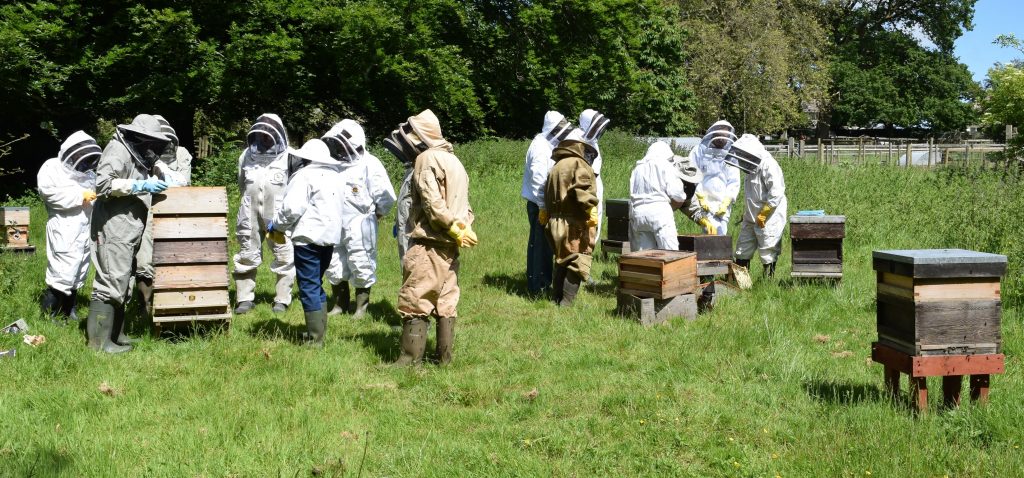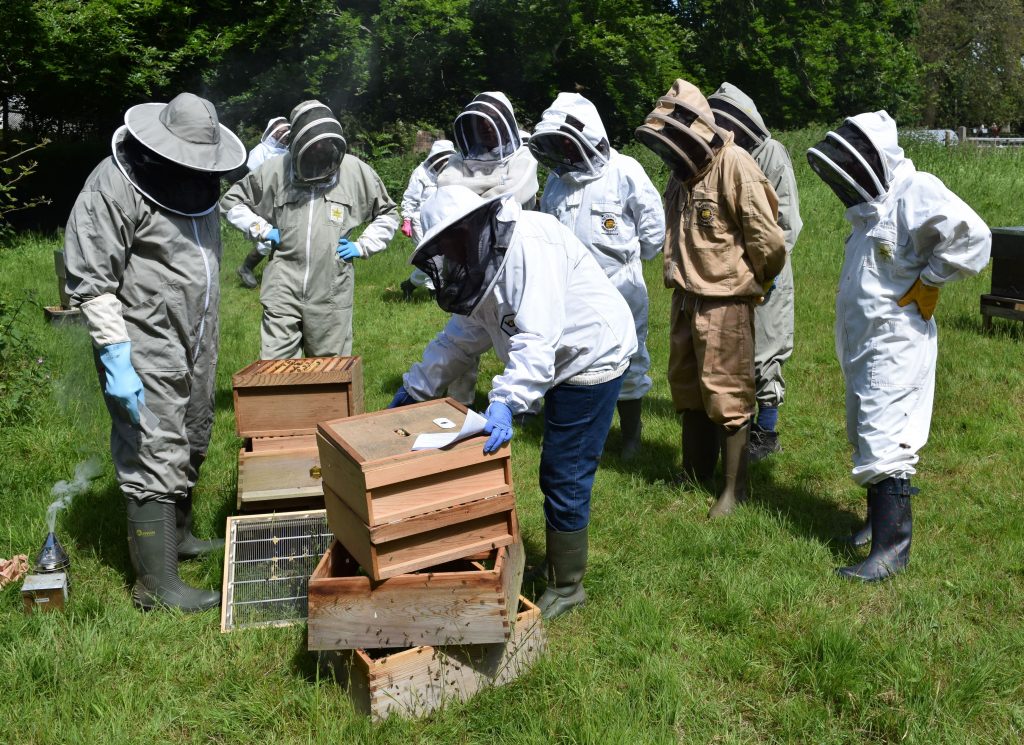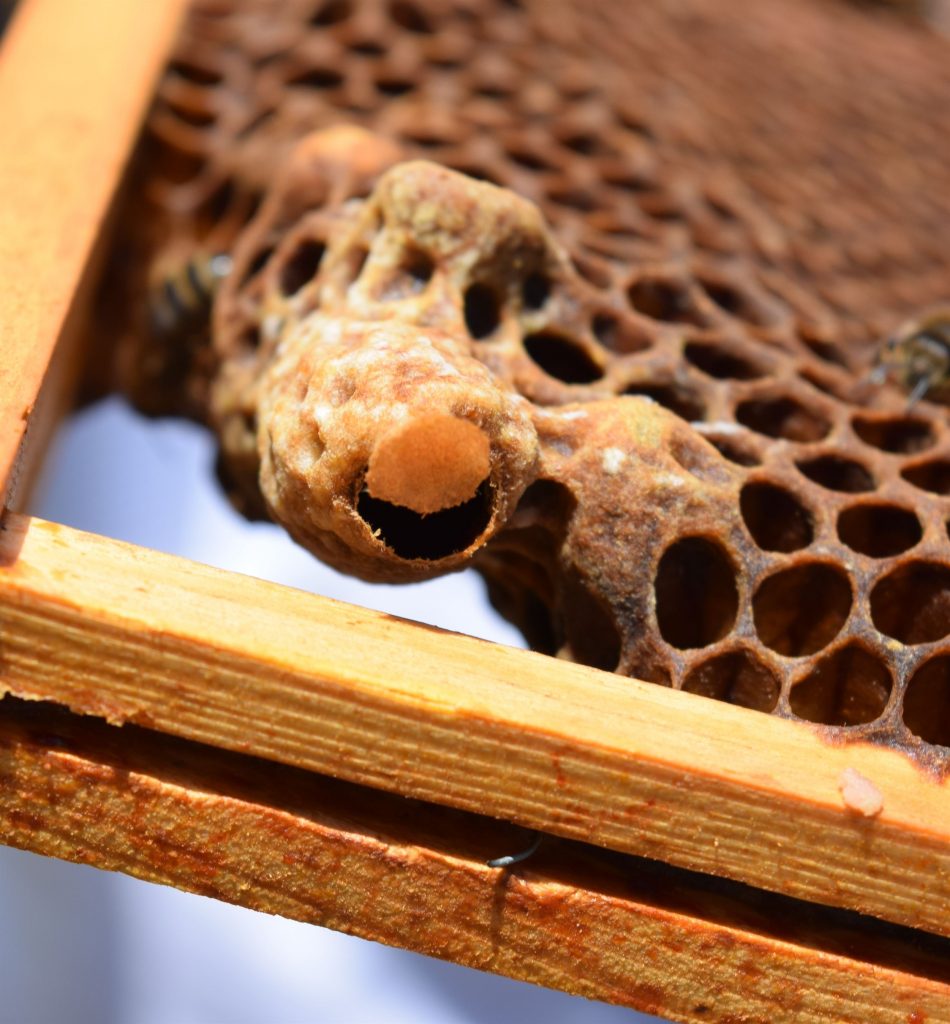Monday 27th May
We changed the day again because of a forecast of thunderstorms which actually never happened which was annoying, especially as there was an Event going on at Stinsford Church so parking was a bit of an issue.

However, we had a good turn-out of members who are potentially interested in taking the Basic Assessment. Some were beginners and some were more experienced beekeepers. It is a requirement by the BBKA that those taking the Basic Assessment should have kept a colony of bees for at least twelve months.
Lesley Gasson, who is an Assessor for the Basic, took this group through a mock assessment using the WBC hive, which is the only hive at the moment we could guarantee is queen-right and with brood in all stages.

It is a good idea for all beginners to plan do the Basic Assessment. Planning ensures you are better informed of the basics. Those who wish to put a hive on an allotment may find it is a requirement of the allotment manager that they have done the Basic Assessment.
Lesley showed and asked us through the Basic Assessment. It was clear that the Basic Assessment is not difficult for those who have handled bees even briefly. All those present had no problem demonstrating opening up a hive, identifying the different types of cells and the different types of bees. They were also able to describe the difference between healthy frames and unhealthy frames.
There were only two areas where the group had problems. The first problem was remembering the number of days in each part of the life cycle. The other problem was describing the the Pagden method of swarm prevention. For those wanting an explanation of the Pagden Method see the beeInfo page.
I think all the beginners felt more confident about the Basic Assessment and several expressed an interest in doing it once they have kept a colony for at least twelve months. Full details can be found on the BBKA site from where you can download a copy of the syllabus.
For those who have kept a colony for at last 12 months the person to contact is Terry Payne who will send you a link to the application form. That you will fill in and pay the £25 registration fee. This should then be sent off by the middle of June at the latest.
The deadline on the BBKA website says the end of July but that means any assessment would not be done till the bees are getting ready for winter. Not a good time to be doing your Basic Assessment.
Looking in the other hives:
Hive 1: We should have looked at this one last week as they had brought on more queen cells. There were far less bees so it is more than likely they had thrown at least one cast.
All the queen cells were capped so we left one we thought looked the best.
It is very difficult to choose a ‘good’ queen cell. The size of the queen cell is not necessarily an indicator of a good queen emerging. Those that are ‘dimpled’ and of medium length are likely to be good. Queen cells that have only just been sealed are usually quite smooth, bees dimple them as they get older. The shorter queen cells may contain poorly nourished queens and in the longer ones the queen may have become detached from the food before sealing.

In Hive 2, (CBPV hive) This hive has consistently surprised us. Not only has it recovered from CBPV, they have brought on a queen who is laying well. The colony is still small but if she continues with this laying pattern it will go from strength to strength.
In the WBC the Queen is still laying well and still no signs of swarming.
In the Nuc set up last week from the WBC there was a capped queen cell although fewer bees which is not a good sign. The queen cell is small so may be undernourished. Obviously we did not shake in as many bees as we should have done. You have to take into account that half the bees you shake in may be foragers who will return to the parent hive. Very little stores so some fondant was left on the cover board.
Hive 3, 3a and the Nuc. Last week we left one open charged queen cell in each hive. Today we found they had all brought on more cells which were capped so again the problem of choosing the best one. However, we also found some queen cells that had their tops chewed off so potentially virgins had emerged. They all had enough bees and stores.
So…we have quite a few colonies that will have virgins emerging and trying to get mated this week. We have got to hope for good weather as that is such an important factor in the mating process. Next week we will have to be a bit wary around the hives as we would not want to disrupt any mating flights.

